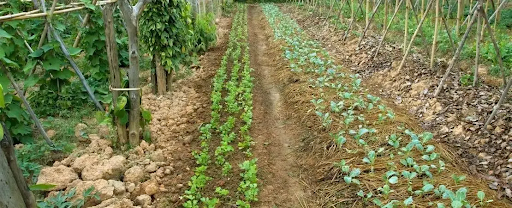In the world of gardening, choosing the right seeds can make all the difference. For those who are passionate about sustainability, quality, and tradition, organic heirloom seeds offer an excellent choice. These seeds not only provide you with natural, non-GMO plants but also connect you with generations of gardeners who have cultivated and cherished them. If you’re ready to grow a garden that’s rooted in history and organic goodness, this blog will introduce you to the magic of organic heirloom seeds and what makes them such a vital part of sustainable gardening.
What Are Organic Heirloom Seeds?
Organic heirloom seeds are open-pollinated seeds that have been passed down through generations, typically for over 50 years. These seeds are naturally grown without the use of synthetic chemicals, pesticides, or fertilizers. Unlike modern hybrid or genetically modified (GMO) seeds, heirloom seeds are preserved for their taste, hardiness, and cultural significance, ensuring that their unique traits remain intact.
Why Choose Heirloom Over Hybrid or GMO Seeds?
One of the key advantages of organic heirloom seeds is their ability to produce plants that are true to type. This means that the plants you grow from heirloom seeds will resemble the parent plant in terms of appearance, flavor, and growth habits. In contrast, hybrid or GMO seeds often lack this consistency and may not produce identical plants in subsequent generations.
Moreover, organic heirloom seeds promote biodiversity by preserving rare plant varieties that may otherwise be lost due to the dominance of commercial hybrid seeds. By planting heirlooms, gardeners contribute to the preservation of unique genetic traits that have been cultivated for decades or even centuries.
The Benefits of Growing Organic Heirloom Seeds
Organic heirloom seeds come with a host of benefits that appeal to both novice and experienced gardeners alike. From rich flavors to environmental sustainability, these seeds offer a wide range of advantages that go beyond mere aesthetics.
1. Superior Taste and Quality
One of the most celebrated aspects of organic heirloom seeds is the exceptional flavor of the produce they yield. Heirloom varieties have been carefully selected for taste, often far surpassing the flavor of commercially grown fruits and vegetables. For example, heirloom tomatoes like the Cherokee Purple or Brandywine are prized for their rich, full-bodied flavors that simply cannot be replicated by most store-bought tomatoes.
2. Environmental Sustainability
Choosing organic heirloom seeds is an environmentally friendly decision. Since these seeds are grown without synthetic chemicals or genetically modified organisms, they support healthy soil and reduce the chemical load on the environment. Furthermore, heirloom plants tend to be more adaptable to local climates and conditions, making them a more sustainable choice for home gardeners.
3. Seed Saving
One of the unique benefits of organic heirloom seeds is their ability to be saved and replanted year after year. With modern hybrid seeds, saving seeds often leads to unpredictable results. However, heirloom seeds allow you to harvest seeds from your crops, ensuring a self-sustaining garden for future seasons.
4. Cultural and Historical Significance
Organic heirloom seeds often come with a rich history, offering a direct link to past generations of farmers and gardeners. By planting heirloom seeds, you’re not just growing a garden; you’re preserving a piece of agricultural history and keeping traditional varieties alive for future generations.
How to Buy Organic Heirloom Seeds
The popularity of organic heirloom seeds has grown significantly in recent years, making it easier than ever to find and purchase them. Here are some tips for buying organic heirloom seeds:
1. Buy From Reputable Seed Companies
It’s essential to buy organic heirloom seeds from trusted sources to ensure you’re getting genuine, high-quality seeds. Look for companies that specialize in organic and heirloom varieties, and always check for certifications like USDA Organic. Reputable companies often provide detailed information about the seed’s history, growing conditions, and care requirements.
2. Read Reviews and Seek Recommendations
When buying heirloom seeds, especially online, it’s helpful to read reviews from other gardeners. Sites that sell heirloom seeds often have customer reviews that can offer insights into the quality and performance of the seeds. Additionally, joining online gardening communities can provide valuable recommendations on where to purchase heirloom seeds and how to grow them.
If you’re already familiar with purchasing gardening supplies, you may be buying grass seed online. The same ease and convenience can be applied to purchasing organic heirloom seeds from trusted online platforms. As with grass seed, ensuring the source is reputable guarantees you’re getting the best possible product for your garden.
3. Explore Seed Exchanges and Local Markets
In addition to buying heirloom seeds online or from a seed company, you can also explore local seed exchanges or farmer’s markets. These community-driven exchanges allow you to trade seeds with fellow gardeners and often offer heirloom varieties that are well-suited to your local climate.
Caring for Organic Heirloom Seeds
Growing heirloom plants from seed requires some special considerations to ensure a successful harvest. Here are some essential tips for caring for your organic heirloom seeds:
Proper Storage: Keep your heirloom seeds in a cool, dry place until you’re ready to plant them. Excess heat and moisture can reduce their viability.
Planting at the Right Time: Be sure to plant your seeds according to the recommended planting season for your region. Follow the instructions on the seed packet for optimal results.
Water and Fertilizer: While heirloom plants are generally more robust than hybrids, they still need proper care. Water them regularly, and use organic fertilizers to promote healthy growth.
Conclusion
Choosing organic heirloom seeds for your garden offers a wealth of benefits, from superior taste and environmental sustainability to the preservation of cultural and historical significance. Whether you’re a seasoned gardener or just starting out, incorporating heirloom seeds into your planting repertoire can enhance your gardening experience in countless ways.
